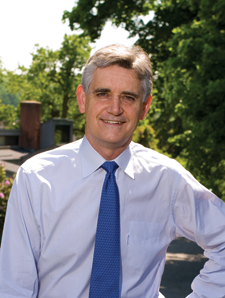Life and career
Stillman was educated at Glen Waverley High School (1966-1969) and Sydney Boys High School (1970–71), then graduated with First Class honours from the University of Sydney, and earned his PhD from the John Curtin School of Medical Research at the Australian National University.
He began his career at Cold Spring Harbor Laboratory in 1979 with investigations into how DNA is copied, starting with studying DNA replication of human adenovirus as a model. He then began to study how the genome of simian virus 40 (SV40) is duplicated in cells. Eventually his research focused on how cellular chromosomes are duplicated and how the entire process is regulated in cells, studying the process primarily in the yeast S. cerevisiae and in human cells. This work provided key insights into how both virus and cellular oncoproteins manipulate cellular physiology to bring about oncogenic transformation.
One of his most significant achievements was the biochemical reconstitution with purified proteins of the complete replication of the SV40 DNA genome. This system utilized the virus-encoded T antigen that binds to the SV40 virus origin of DNA replication, the start site for DNA synthesis, coupled with purified human proteins, [7] many of them discovered by Stillman and his colleagues. These proteins include RPA, RFC, PCNA, and the discovery that multiple DNA polymerases participate in the process of copying DNA, often switching from one polymerase to the other.
Another major accomplishment was the discovery of the Origin Recognition Complex (ORC), a key protein made up of six subunits that binds to cellular origins of DNA replication and coordinates the entire process of initiating a complete cycle of DNA replication throughout the entire cell genome. Soon after the discovery of ORC, Stillman's group identified other initiation proteins that together form the pre-replication complex (pre-RC), which makes chromosomes competent for the subsequent initiation of DNA replication during the S phase of the cell cycle. [8] [9] [10] His group's recent studies have revealed the intricate details of the mechanism of the initiation of DNA replication and illuminated how this process is regulated throughout the cell cycle, including the mechanisms that prevent DNA replication from occurring more than once during each cell cycle. These studies include elucidation of the structure of ORC and its associated pre-RC proteins.
Stillman has also studied how the proteins associated with the cellular DNA are inherited as cells divide. The proteins that combine with DNA to organize the genome into a chromatin structure include histones. He developed a biochemical system to study DNA replication-coupled chromatin assembly in a test tube and discovered proteins such as Chromatin Assembly Factor-1 (CAF-1) that cooperate with the DNA replication machinery to assemble new histones onto the DNA. These studies resulted in understanding how chromatin is inherited.
This page is based on this
Wikipedia article Text is available under the
CC BY-SA 4.0 license; additional terms may apply.
Images, videos and audio are available under their respective licenses.
